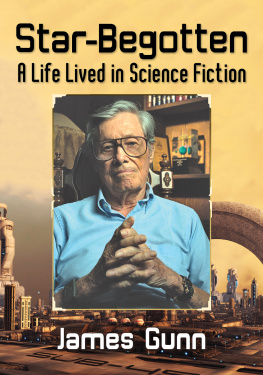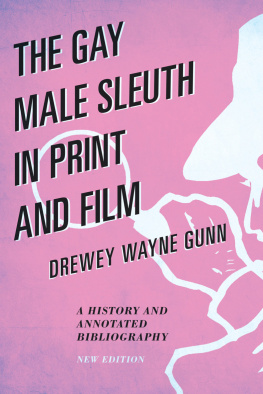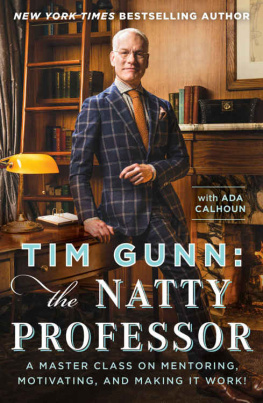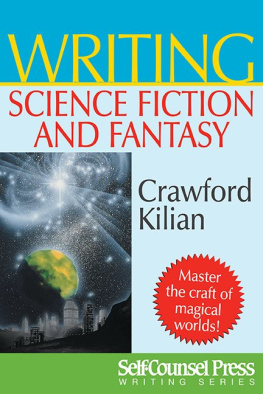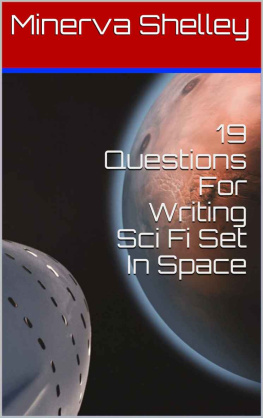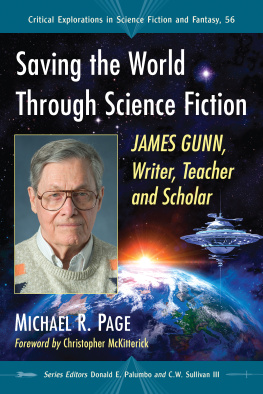
Star-Begotten
A Life Lived in Science Fiction
James Gunn

McFarland & Company, Inc., Publishers
Jefferson, North Carolina
The text in a different typeface are contemporary accounts of trips I made for the USIA, acceptance remarks I made for awards bestowed, and memorials for the deaths of family members and fellow writers.
LIBRARY OF CONGRESS CATALOGUING DATA ARE AVAILABLE
BRITISH LIBRARY CATALOGUING DATA ARE AVAILABLE
e-ISBN: 978-1-4766-2966-7
2017 James Gunn. All rights reserved
No part of this book may be reproduced or transmitted in any form or by any means, electronic or mechanical, including photocopying or recording, or by any information storage and retrieval system, without permission in writing from the publisher.
On the cover: James Gunn in his living room at the house on Orchard Lane (photograph by Jason Dailey); futuristic background 2017 mik38/iStock
McFarland & Company, Inc., Publishers
Box 611, Jefferson, North Carolina 28640
www.mcfarlandpub.com
To all those who have given meaning to my life
particularly my parents, my wife of 65 years, and my two sons
and to the literature of change that gives us hope and
purpose and sometimes insight.
Introduction: A Title from H.G. Wells and a Brush with Greatness
Every memoir contains the unwritten presumption that something remarkable about a life justifies attention, that something in the experiences it recounts is unusual, instructive, and, most of all, interesting. Well, one of the secrets of the writing craft that I passed along to my fiction-writing students is that all lives are interesting, even unusual and instructive, if you look at them intently enough. I hope this memoir is a demonstration of that advice.
H. G. Wells, the father of modern science fiction, titled the story of his life Experiment in Autobiography: Discoveries and Conclusions of a Very Ordinary Brain. Though suitably humble, it was inaccurate: Wells rose from improbable beginnings to world fame and influence. His disclaimer of extraordinary mental powers may have been an argument that it didnt take unusual mental abilities to observe, and maybe find some solutions for, the problems of the world that was changing around him. But he did have an extraordinary brain.
I didnt choose the title of my memoir from his autobiography but from a lesser-known novel published late in his career, Star-Begotten. It is not typical Wells. There are no alien invasions, no time machines, no trips to the moon by anti-gravity, no apocalyptic transformations of the human species. It is a quiet social drama focused around a mans obsession with the notion that peoples minds are being taken over by aliens. In my case, my life was taken over at a young age by the alien influence of words on a page, magical words telling magical stories about peoples lives being transformed, as mine would be, by science and technology and inspired speculations about change.
I feel a personal connection to Wells. In 1937, when I was 14 and Wells was making a speaking tour of the U.S., my uncle took my brother and me to hear him speak. He was short and dumpy, and he spoke in a squeaky voice. I dont remember what he said, but it was a great occasion anyway, and my brother and I pressed forward to shake his hand as he made his way through the crowd. Alas, he passed us by without a glance, unaware of my admiration and ambition.
In the later days of my career I began signing my letters and e-mails with a phrase that echoed the point of Wellss Open Conspiracy, Lets save the world through science fiction. In the pages that follow I will try to describe how I came to that hyperbole.
Like Wells, I was born in ordinary circumstances, though in an extraordinary conjunction of events that I will describe in more detail in the pages that follow, in a rented house in a working-class neighborhood. I went to neighborhood schools and nearby colleges, served in the Navy during World War II, returned to finish my degree in journalism, launched a writing career, got a graduate degree in English, became involved in university administration and then teaching. All of that describes a life trajectory that though unlikely was not quite Wellsian.
My father was a printer; my mother, who lost her mother at the age of 12, was a comptometer operator for a time before her marriage. I didnt discover until late in their lives that neither attended high school. I never knew that because they were both self-educated and perhaps because primary education was more rigorous thenmy father was well read (he particularly liked Civil War histories and westerns) and an expert bridge player, and my mother was president of the PTA throughout my grade-school experience. No one in my mothers and fathers family had gone to college except for my paternal grandfather who attended a normal school, later known as a teachers college, for a year, but he was an unusual man in many ways.
I was a child of the Depression, but I dont recall worrying about money, although I knew that it was scarce and I was aware of the hard times around me. Those were times when having a father who never lost his job was unusual. But I never had any doubt that education would open the future for me and my older brother, that I would go to college, and that I would find some way to use my fascination, and developing skills, with words and writing and stories. No one in my family or my schools or among my acquaintances ever suggested that this was an unlikely scenario, that my expectations, my ambitions, would lead to disappointment. But no one would have predicted, either, that my brother would become a physician and that I would end up as a university professor with a career in science fiction.
This is the way it worked out, not just the story of a life but the story of the peculiar literature of our times, the literature of change, as it was experienced in a place and time far from the hotbeds of its existence on the coasts. And to end as a teacher of writers and teachers, the author or editor of 45 books, more than a hundred short stories, and countless articles, the president of both the science-fiction writers organization and of the academics who made science fiction a respected arena of teaching and criticism during my career, with life-time awards from both, including a Grand Master Award and induction into the Science Fiction and Fantasy Hall of Fame. How that came about and the unusual turns of events that made it possible begin with my birth in a rented house in Kansas City, Missouri.
One
An Unlikely Life, an Unusual Family and a Quest for Education
I was born in Kansas City, Missouri, in a two-story rented house at 3416 East 10th Street. That part of northeast Kansas City had seen better daysthe houses on East 10th were substantial when they were built in the late 19th century, but the original owners had moved on and renters had moved in. My brother Richard, my elder by 19 months, had been born in a hospital but I was born at home.
Across the street and a bit up the hill west was a large building with red siding that was called the Finley Engineering School. I was never inside. Behind our house, on 9th Street, was a long cement-block garage owned by Joe Cirese. He also owned the vacant lot to our east where, some years later, he drilled a gas well and left a big stack of large metal pipes on which I played and one rolled over me, leaving me with a sore back. He stored equipment there as well. The only other memory I have of the lot is the time a group of neighborhood bullies were urging another boy to fight me. I was wearing shoes, however, and he wasnt. I would lunge toward him and maybe land a light blow or two before dancing back onto a field of rocks where he couldnt follow. It was the only fight I ever had, and I was happy when the other boy gave up and left.
Next page
